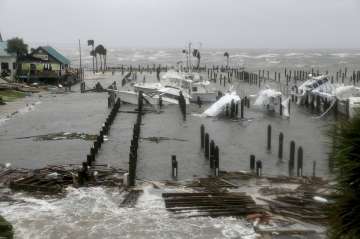At least one killed as deadly hurricane Michael makes landfall in Florida, charges into southeast US
Based on its internal barometric pressure, Michael was the third most powerful hurricane to hit the US mainland, behind the unnamed Labor Day storm of 1935 and Camille in 1969.

At least one person was killed on Wednesday as Hurricane Michael, the most powerful hurricane to hit the continental US in nearly 50 years, slammed into the Florida Panhandle with terrifying winds of 155 mph splintering homes and submerging neighborhoods before continuing its destructive charge inland across the Southeast.
Supercharged by abnormally warm waters of the Gulf of Mexico, the Category 4 storm crashed ashore in the early afternoon near Mexico Beach, a tourist town about midway along the Panhandle, a 200-mile (320-kilometer) stretch of white-sand beach resorts, fishing towns and military bases. After it ravaged the Panhandle, Michael barreled into south Georgia as a Category 3 hurricane — the most powerful ever recorded for that part of the neighboring state. It later weakened to a Category 1 hurricane, and there were reports it spawned possible tornadoes in central Georgia.
In north Florida, Michael battered the shoreline with sideways rain, powerful gusts and crashing waves, swamping streets and docks, flattening trees, shredding awnings and peeling away shingles. It set off transformer explosions and knocked out power to more than 388,000 homes and businesses.
A Panhandle man was killed by a tree that toppled on a home, Gadsden County Sheriff’s Office spokeswoman Anglie Hightower said. But she added emergency crews trying to reach the home were hampered by downed trees and debris blocking roadways. The man wasn’t immediately identified.
Damage in Panama City was extensive, with broken and uprooted trees and power lines down nearly everywhere. Roofs were peeled off and homes split open by fallen trees. Twisted street signs lay on the ground. Residents emerged in the early evening to assess damage when rains stopped, though skies were still overcast and windy.
Gov. Rick Scott announced soon after the powerful eye had swept inland that “aggressive” search and rescue efforts would get underway as conditions allowed. He urged people to stay off debris-littered roads.
“If you and your family made it through the storm safely, the worst thing you could do now is act foolishly,” he said.
Michael was a meteorological brute that sprang quickly from a weekend tropical depression, going from a Category 2 on Tuesday to a Category 4 by the time it came ashore. It was the most powerful hurricane on record to hit the Panhandle.
More than 375,000 people up and down the Gulf Coast were urged to evacuate as Michael closed in. But the fast-moving, fast-strengthening storm didn’t give people much time to prepare, and emergency authorities lamented that many ignored the warnings and seemed to think they could ride it out.
Based on its internal barometric pressure, Michael was the third most powerful hurricane to hit the US mainland, behind the unnamed Labor Day storm of 1935 and Camille in 1969. Based on wind speed, it was the fourth-strongest, behind the Labor Day storm (184 mph, or 296 kph), Camille and Andrew in 1992.
Forecasters said it would unleash damaging wind and rain all the way into the Carolinas, which are still recovering from Hurricane Florence’s epic flooding.
At the White House, President Donald Trump said, “God bless everyone because it’s going to be a rough one,” he said. “A very dangerous one.” His office said he would tour the devastated areas next week.
In Mexico Beach, population 1,000, the storm shattered homes, leaving floating piles of lumber. The lead-gray water was so high that roofs were about all that could be seen of many homes.
Hours earlier, meteorologists watched satellite imagery in complete awe as the storm intensified.
“We are in new territory,” National Hurricane Center Meteorologist Dennis Feltgen wrote on Facebook. “The historical record, going back to 1851, finds no Category 4 hurricane ever hitting the Florida panhandle.”
The storm is likely to fire up the debate over global warming.
Scientists say global warming is responsible for more intense and more frequent extreme weather, such as storms, droughts, floods and fires. But without extensive study, they cannot directly link a single weather event to the changing climate.
WATCH VIDEO: